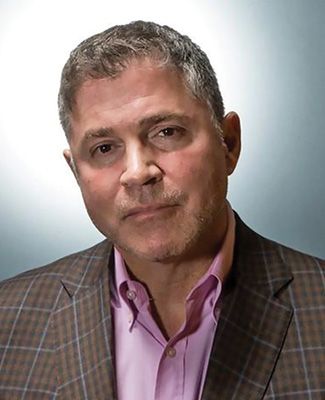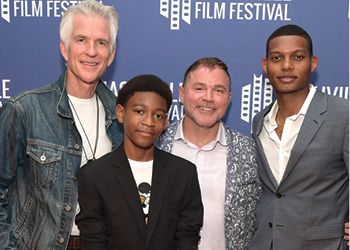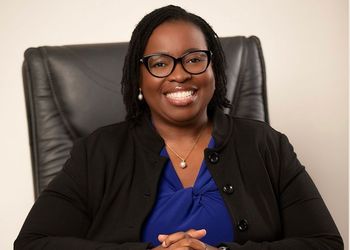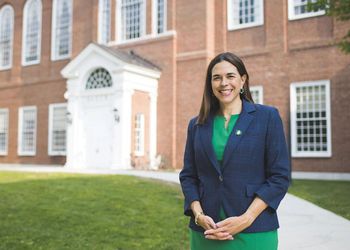Believing in Art’s Power to Spark Awareness and Action

Believing in Art’s Power to Spark Awareness and Action
Amplifying voices, through his screenplay for "Foster Boy," Jay Paul Deratany, '84, highlights unnerving realities in U.S. Foster Care
May 18, 2021Jay Paul Deratany simply will not look the other way.
Exposed to corruption in the nation’s foster care system as an attorney working on a case, Deratany continues tackling the horrors of a broken system on two fronts. As an experienced trial attorney, Deratany advocates for the protection of foster children against neglect and abuse in the U.S. legal system. As a screenwriter, Deratany amplifies that message. His screenplay for the award-winning 2019 film “Foster Boy,” a tale ignited by Deratany’s real-world legal career and starring Matthew Modine and Louis Gossett Jr., leverages the reach of the silver screen to illuminate negligence in the foster care system.
The Spartan connected with Deratany, a native of Warren, Michigan, to discuss his enduring commitment to reform the foster care system and the role creative pursuits play in this effort.
A political science major at MSU,Deratany savored his creative writing and theater classes as an undergraduate yet struggled to see the arts as a viable professional option.
“Like so many around me in the 1980s, I went the practical route and enrolled in law school.”
In 1992, Deratany started his own law firm in Chicago and quickly gained recognition as a top trial attorney. Around 2000, a fellow attorney sent Deratany a case about three children injured in the foster care system. The case opened Deratany’s eyes to private foster care, something he knew nothing about. “The idea that a huge corporation could be involved in foster care, treating kids as a commodity, was offensive and appalling to me.”
After that initial case, one that resulted in a $23 million settlement, Deratany took on additional cases of foster care neglect and abuse, battling both state agencies and for-profit corporations. “I took one after another because I knew it was important work that made a difference.”
One such case involved a boy in Pennsylvania who was raped repeatedly by an older child in his foster home. Despite the older child’s history of being sexually aggressive with other children, the for-profit agency placed the younger child in the home anyway. “No corporation or state has the right to take custody of a child and knowingly place that child in danger,” Deratany said. Children have a constitutional right to live their life without injury.”
While Deratany pursued his MFA at the University of California, Riverside, a degree he would earn in 2013, a professor encouraged Deratany to “write what you know.” Deratany took the advice and began crafting an amalgamated story about different child abuse cases he had encountered as an attorney. “My professor saw my heart was into it, and that stoked my passion.”
That professor showed Deratany’s story to a film producer, which launched a fortuitous chain of events that included Deratany developing a screenplay and basketball legend Shaquille O’Neal signing on to be the film’s executive producer. “With a legal case, I’m speaking to a jury, but that’s only 12 people. With the film, I had an opportunity to take my message to the next level, to speak to a larger audience and encourage broader social change.”
We need to correct an imbalanced system and protect kids.
Deratany took that challenge to heart, pouring himself into the writing life. He reached into the raw emotions of past foster care cases and transformed hurt and pain, shock and ire into compelling scenes, characters and dialogue. The writing process intensified his mission and sharpened his resolve, and Deratany embraced the opportunity to give voice to children caught in a defective system. “Confronting content like that, you get to hard moments, but you also discover truth.”
With the film’s awards and star power, “Foster Boy” disclosed the unseemliness of a fractured, though largely hidden, system and provided Deratany, himself a foster father, a bigger platform to speak about the foster care system’s disconcerting realties. “It breaks your heart to see children being abused and the government agencies and for-profit corporations not being forthright about the level of abuse or neglect happening in foster care.”
O’Neal, Deratany and others are currently developing a television series to build upon the film’s success and its message. Poised to appear on a major cable network, the series will share realities of the foster care system through based-on-true-story accounts.
“We might be a divided country, but we all have to appreciate our children and lift them up.
Deratany’s hope is systemic change, and he believes in art’s power to spark awareness and action. While some of the nation’s nearly 500,000 children in foster care live in safe, supportive environments, far too many encounter gross negligence that sparks negative outcomes. Forty percent of foster kids who age out of the system, Deratany said, end up dead, homeless or in prison within three years. “We need to correct an imbalanced system and protect kids. That includes nationalized standards, no privatization and many more foster parents. We might be a divided country, but we all have to appreciate our children and lift them up.”








